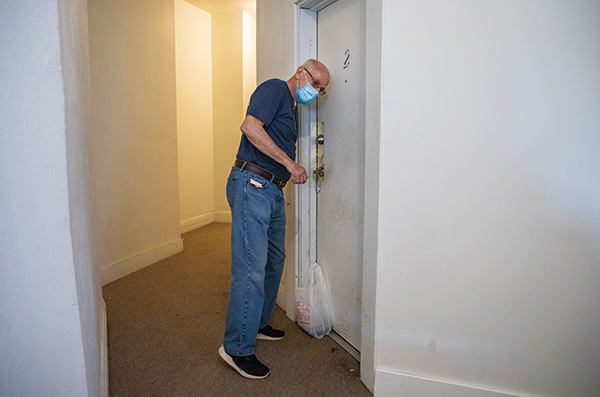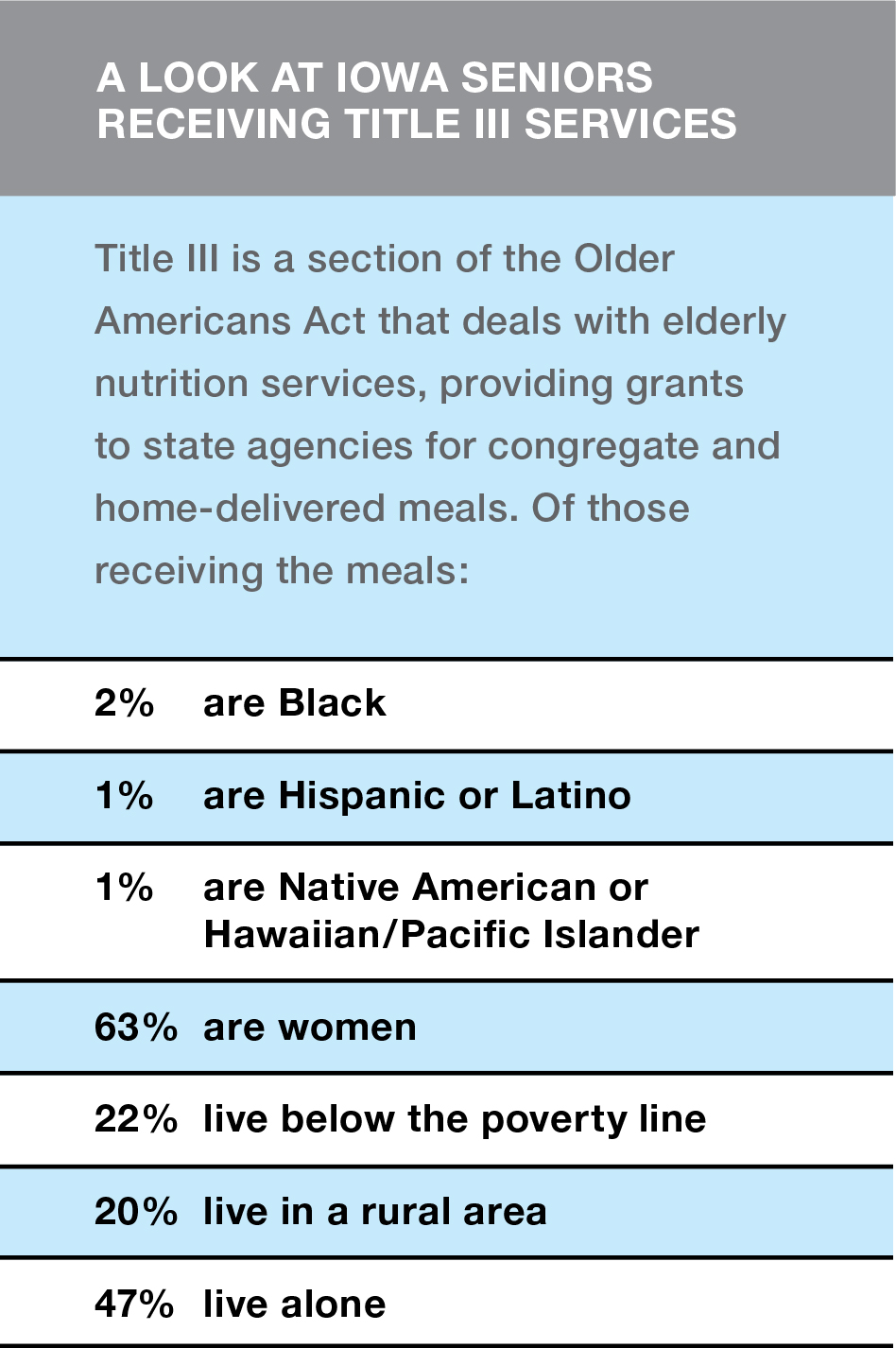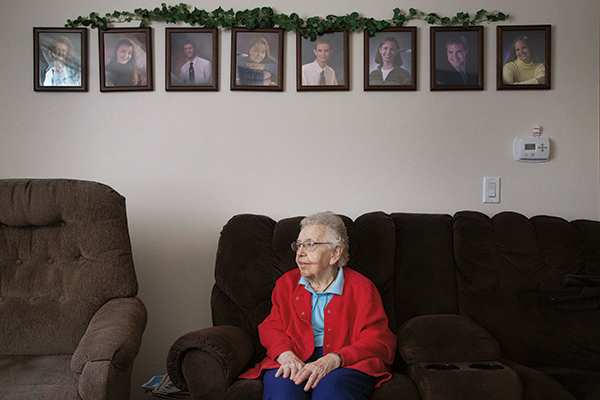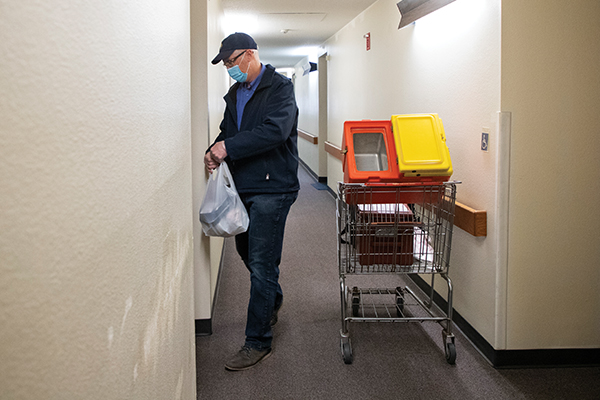Richard Sickels volunteers with Meals on Wheels for WesleyLife in Des Moines, delivering meals to food-insecure elderly Iowans three days a week. Many times, he’s the only person his clients talk with on a regular basis.
Three days a week, rain or shine, Richard Sickels weaves through Des Moines streets, alleyways and parking lots in a white Chevrolet Trax, delivering hot meals to more than 40 at-need elderly Iowans.
A retired pastor, Sickels began delivering Meals on Wheels for WesleyLife—which provides a network of services to support older Iowans—more than two years ago. He’s been on his route long enough to build up a routine. He prides himself on punctuality.
He arrives at WesleyLife to load up his deliveries at 9:45 a.m. By 10:30 a.m. the meal is already hanging on his first client’s doorknob and he’s on his way to the next apartment down the street.
He quickly raps on the door.
“Mr. Schmidt, it’s Richard! Meals on Wheels!” he says loudly through a closed door. Once he hears a distant “thank you,” he places the plastic bag carrying a disposable tray of beef tacos and mixed vegetables on the front steps.
Before working at WesleyLife, he had no idea how many elderly Iowans were food insecure. “I never realized how many vulnerable adults needed help,” he says. “I was just flabbergasted.”

Richard Sickels brings food to the door of one of his clients in Des Moines. His work with Meals on Wheels has opened his eyes to the need for food among elderly Iowans.
Growth in Hunger
As of 2016—the most recent data available—more than 80,000 Iowans age 60 and older were food insecure. That number is likely to be far higher today, says Bambi Press, director of community nutrition at WesleyLife. The Iowa Department on Aging and its six area agencies throughout the state attempt to fill that void, providing home-delivered and congregate meals on a voluntary contribution basis for Iowans over age 60.
About 85% of WesleyLife’s Meals on Wheels clients receive some sort of financial assistance, but income level isn’t the only factor contributing to food insecurity. A lack of mobility and inadequate nutrition are also factors.
“A big part of what we do in terms of food insecurity is supporting people who have outlived their savings or didn’t have it to begin with … but not always,” Press says. “Sometimes it’s because people physically can’t prepare their own food or shop for themselves. Some can’t see well enough to order their groceries online. Some might forget to eat at all unless someone reminds them.”
The pandemic exacerbated the problem. For many elderly Iowans, trips to the grocery store or visits with family members could be life-threatening. More than 17,000 seniors who had depended on congregate meals had to find food elsewhere after 200 senior centers, churches, American Legion halls and other municipal buildings used for meal sites closed. That highlighted the need for home-delivered meals such as Meals on Wheels.
Meals on Wheels serves 2.4 million seniors across the United States and more than 10,000 Iowans. In Polk County, WesleyLife saw a 40% increase in new clients during the early days of the pandemic, from 1,500 to about 2,000. In just over a year, they’ve delivered more than 257,000 meals. Across the state, the Department on Aging reports the number of home-delivered meals increased by 256% in a seven-month period after the pandemic hit. By using nearly $400,000 in CARES Act funding, the department contracted with the Food Bank of Iowa to provide 1.48 million meals to 191,000 older Iowans between May and December 2020.
“We talk so much about food-insecure kids, which absolutely is critical, but older adults often get left out of the conversation because they’re out of sight, out of mind,” Press says. “They’re … just suffering in silence.”
 Depending on Help
Depending on Help
As a part-time employee of WesleyLife, Sickels is one of hundreds of people working to serve food-insecure seniors in Greater Des Moines. Some of his clients rarely come to the door. Others enjoy visiting—sometimes, Sickels is the only person they see regularly.
Jane, whose last name is being withheld for privacy, is one of those who look forward to his visits. Every Monday, Wednesday and Friday, at 11:40 a.m. on the dot, Jane gets a call that Sickels is at the lobby door.
“I’ll buzz ya in, kid!” she says enthusiastically on a Wednesday delivery day last April during an unseasonable snowfall.
Until April, Jane’s apartment building had COVID-19 restrictions in place in which all of the meal deliveries had to be dropped off at the front desk. Sickels and Jane were only able to chat briefly from across the lobby. Now that both are vaccinated, Sickels can hand Jane her meal himself and stay and chat for a few minutes. The two often talk about the weather—Jane worked in climatology at the National Weather Service for 30 years before retiring in 1988.
“Did you order this snow?” Sickels says.
“Isn’t it beautiful? It’s all over the trees and the lawn, and the snowflakes were enormous,” Jane says.
“Have you looked at your calendar lately? It’s April the 19th. Snow is not beautiful,” Sickels says.
“Well, it was forecast,” she says. “I have to stick up for the weather service, you know.”
About 29% of Iowans age 65 and older live alone, including Jane, who turned 91 in October. Her husband, Jack, died in 2000. Her two siblings died more than 10 years ago. She doesn’t have any children. Many of her childhood friends are also gone. Some days, Sickels is the only person she talks to—“except for the nuisance calls. Boy, do I get those,” she says.
Jane still has her driver’s license but doesn’t get out much. When she does drive, it’s usually to Walgreens to pick up her medications or to the Price Chopper down the street to pick up fruit, raw vegetables, crackers and a pack of Coors Banquet.
Despite being the daughter of a home economics teacher, Jane doesn’t often cook. “Mother didn’t want her kids in her kitchen laboratory,” she says. Jack was the one who cooked, and when he died, she ate out a lot. It wasn’t until four years ago, after being hospitalized following a bad fall, that her doctor told her to enroll in the Meals on Wheels program. She now receives five meals a week.
“I depend on Meals on Wheels, I really do,” Jane says.
For Sickels and many other volunteers, the service is about more than just providing food. It’s about creating a relationship and making a difference. During his meal drop-offs, Sickels always asks his clients how they’re doing. One time, he recalls, a woman answered, “Now that I’m eating every day, I feel pretty good!”
“To know that you’re helping with that a little bit, that’s nice,” Sickels says. “It’s fulfilling. And it’s more than just taking a meal and saying, ‘Here, put this in your belly.’ It’s about making friendships.”
Doris Tucker has photos of family members prominently displayed at her living space in Manchester. Without having food regularly delivered, Tucker would spend what little money she has on groceries.
A Comfortable Place
A resident of Manchester in northeast Iowa, Doris Tucker has lived within a 15-mile radius her entire life, many of those years on a farm with her late husband, Joe, who died in 2001. She worked for 21 years at the Manchester Press, first as a circulation manager and then as a bookkeeper, before retiring in 1996.
Eight years ago, Tucker moved into what she considers “the greatest place in the world”—an 11-unit senior independent living facility that was once a church.
The walls in her one-bedroom apartment feature photos of her siblings, children, grandchildren and great-grandchildren. On a table next to her favorite recliner is a stack of 130 cards from her 90th birthday and a small collection of pill boxes. She doesn’t have internet, but her TV almost always has a Western playing.
A few years ago, she began receiving home-delivered meals through the Northeast Iowa Area Agency on Aging after a friend recommended the service. Like many other home-delivered meal recipients, Tucker can’t afford to pay the $8.10 cost per meal. She feels fortunate that they’re offered on a voluntary contribution basis, because she wouldn’t be able to afford the program if she had to cover the full price.
She’s still paying off bills from three different stays at a local nursing home for rehab following hospital stays. Her other two big expenses are her monthly rent and paying for her medications, some of which are $100 a month.
“My Social Security check is not enough to take care of something like [the home-delivered meals] on top of the pills I pay for,” Tucker says. “Maybe once a month or every two months I’ll send [the Northeast Iowa Area Agency on Aging] $30, $40 or $50.”
Tucker no longer drives, and before receiving the home-delivered meals, she realized that the groceries she was buying twice a month were going bad. She never liked cooking to begin with, and her appetite was decreasing.
“I was spending a lot of money on food that I really wasn’t using,” Tucker says. “I was real happy to [give up buying groceries] because now I eat what’s served and I love it.”
Steve Miller leaves a bag of food on the doorknob for one of his patrons in Des Moines. His father died earlier this year, furthering his passion for giving back and volunteering.
‘Ray of Hope’
Every day on alternate weeks, Steve Miller spends his lunch hour delivering meals to clients who live in Jacobs Place, a low-income apartment complex for seniors in Des Moines’ Beaverdale neighborhood, where more than a dozen of the 81 residents receive Meals on Wheels.
Mary, whose last name is being withheld for privacy, is one of them. The 72-year-old worked as a housekeeper in a hospital in Kansas before moving back to Des Moines when her husband died.
She started receiving Meals on Wheels five days a week three years ago after having her teeth pulled following a bout of throat cancer, saying that the 52 rounds of radiation made her teeth brittle. She has dentures, but doesn’t wear them because they need to be realigned. Still, she’s able to eat most foods.
Mary is often one of the first people that Miller sees while making his deliveries.
“Hey, hey, hey! How’re you doing, girl?” he asks one day in April as he rolls the grocery cart filled with hot packs down the hallway.
Miller works to get to know his clients personally. Beyond having brief conversations with them, he often checks the bulletin boards in the hallways for birthdays. If he sees that one of his clients has a birthday coming up, he’ll give him or her a balloon or a small plant.
When he discovered that one of the residents liked chocolate ice cream, Miller filled their freezer with frozen fudge pops.
Miller’s father died earlier this year at a memory care facility in Minnesota. “I see a lot of these residents and think, ‘You could be my dad.’ Doing this gives me an opportunity to give somebody a ray of hope that when somebody comes to the door, they’re coming to see them.”













